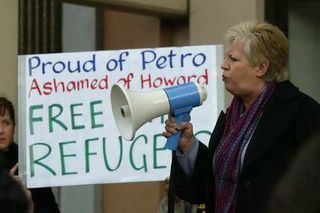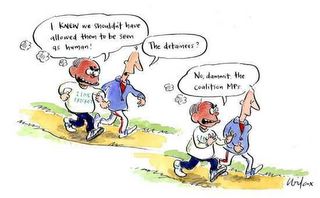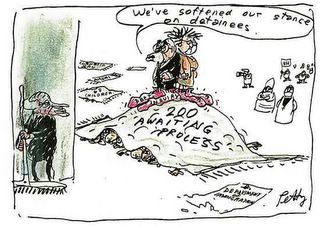Dr Jane McAdam, a law lecturer at the University of Sydney, writing yesterday in the SMH, makes it clear that, even with the changes flagged under the two private members’ bills, "AUSTRALIA'S laws regulating the reception and processing of asylum seekers are uniquely draconian: Australia is the only Western country with a mandatory detention regime for those who arrive without a valid visa. The detention cannot be reviewed by the courts, and there are no limits on its duration.
Two private members' bills by Petro Georgiou address some of these concerns. However, while the bills represent an alternative to the Government's stance, they are far from radical and still lag behind international legal standards and best practice. They do not abolish mandatory detention, but introduce time limits and a mechanism for the release of asylum seekers into the community.
The first, the Migration Amendment (Act of Compassion) Bill 2005, concerns individuals already in immigration detention. It provides for the release of children and their families, and asylum seekers who have been detained for more than a year. Release is not automatic, but is subject to individual assessment by a judicial assessor - a serving or former judge - who must consider whether the individual poses a danger to the public or is likely to abscond.
The second, the Migration Amendment (Mandatory Detention) Bill 2005, modifies mandatory detention for future asylum seekers. Although the bill does not abolish detention, it limits the time a person may be detained - initially 90 days - and restricts detention to cases where incarceration is necessary to verify an identity, assessing an asylum application, protecting public safety, conducting health checks, or ensuring the person's availability for removal. Children may only be detained as a last resort.
Detainees may apply to the Federal Court for release where there are no reasonable grounds for their detention.
Conversely, should the Department of Immigration and Multicultural and Indigenous Affairs believe it necessary to detain an individual for longer than 90 days, it may apply to the Federal Court for such an order.
Under international law, every individual has the right to seek asylum. Although all countries have the right to control immigration, they are also bound to consider asylum claims and to provide protection for people found to be refugees. As a party to the Refugee Convention and various treaties, Australia has accepted these duties.
Australia's system of mandatory detention violates key obligations under international human rights and refugee law. International law prohibits detention as a blanket response to illegal entry or presence, and requires that all detention be reviewable by the courts.
The Refugee Convention provides that states shall not penalise refugees who enter the country illegally. This principle recognises that asylum seekers are vulnerable and may be at serious risk of human rights abuses, and accordingly cannot always avail themselves of the usual legal channels for securing protection.
Immigration detention is used by Australia as a deterrent and to reprimand those arriving unlawfully, applying only to asylum seekers arriving without a visa. Those who arrive with a visa and subsequently claim asylum may remain in the community while their claims are processed.
Despite receiving about 100 times more asylum seekers than Australia, no country in the European Union employs detention as a standard means of accommodating them pending the outcome of their protection claims. In the EU, individuals may not be detained simply because they are asylum seekers, and anyone who is detained must have access to speedy judicial review.
There, detention is used mainly - if at all - at the beginning of the asylum determination procedure to investigate travel routes and to verify identity, and at the very end to arrange travel documents for deportation or to ensure that the rejected asylum seeker does not abscond. It may also be used where the asylum seeker is considered a potential threat to national security.
In Canada, people may be detained only where it is believed they will not appear at immigration hearings, or because they present a public danger. Such detention is subject to review by a senior immigration officer and the courts, and people may be released subject to conditions such as promises to appear at hearings or bonds.
Furthermore, the EU and Canada place strict time limits on detention. In Spain, France and Ireland, the typical period is about four days; in Austria, Germany, Belgium and Luxembourg, the maximum is two to three months. In Canada, the average detention in an immigration centre is about eight days.
The two bills would bring Australia more closely into line with international practice, but are not an extreme overhaul of its policies. Australia will remain the only country with a system of mandatory detention for asylum seekers."















